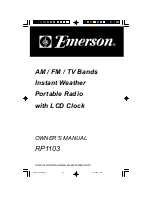
- 1 -
PROFESSIONAL WEATHER STATION
(WIND AND AIR PRESSURE)
Operation Manual
About this manual
Thank you and congratulations on selecting this professional weather station! We are positive
you will enjoy the benefits of accurate weather readings and the precise radio controlled time
information that our instruments offer.
This manual will guide you step-by-step through setting up your device. Use this manual to
become familiar with your professional weather station, and save it for future reference.
Glossary of Common Terms
LCD
“LCD” is an acronym for ”Liquid Crystal Display”. This is a common type of display screen used
in televisions, computers, watches, and digital clocks.
BAROMETER & BAROMETRIC PRESSURE
A barometer is a device that measures the pressure of the air pushing on it—this measurement is
called the barometric pressure. We don’t actually feel the barometric pressure because the air
pressure is pushing equally in every direction.
RELATIVE AIR PRESSURE
Relative air pressure is the same as the barometric pressure. The calculation of relative air
pressure is a combination of the absolute air pressure and the altitude.
ABSOLUTE AIR PRESSURE
Absolute air pressure is the actual air pressure on the barometer without regard to altitude.
INCHES OF MERCURY
(inHg)
Inches of Mercury is the common unit of measurement for air pressure in the United States.
HECTOPASCALS
(hPa)
Hectopascals are the common units of measurement for air pressure in the International System
(SI) of measurement. The hectopascal holds the same value
Important Note:
Before inserting batteries, please carefully read the operation manual.
The Professional weather station includes a base station (receiver), a transmitter unit, one wind
direction sensor, one wind speed sensor, one rain gauge, USB cable and a PC software package
on CD-ROM.
An added feature of the Weather Station is the readout of all measured and displayed time
and weather data on a PC.


































